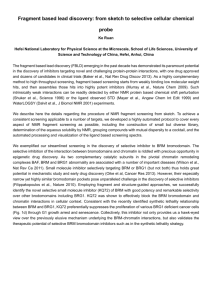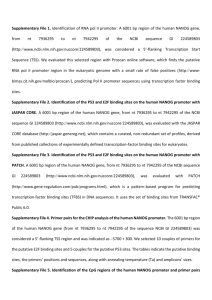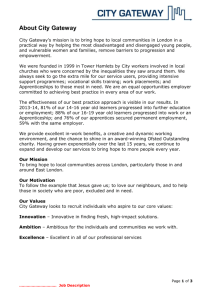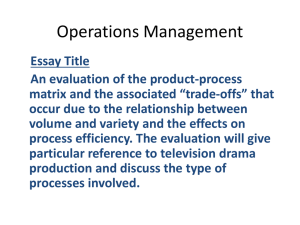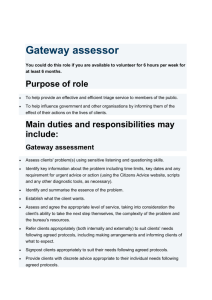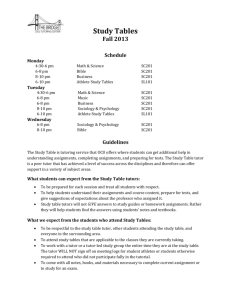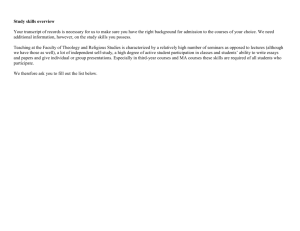Course Handbook Template 2015-16
advertisement
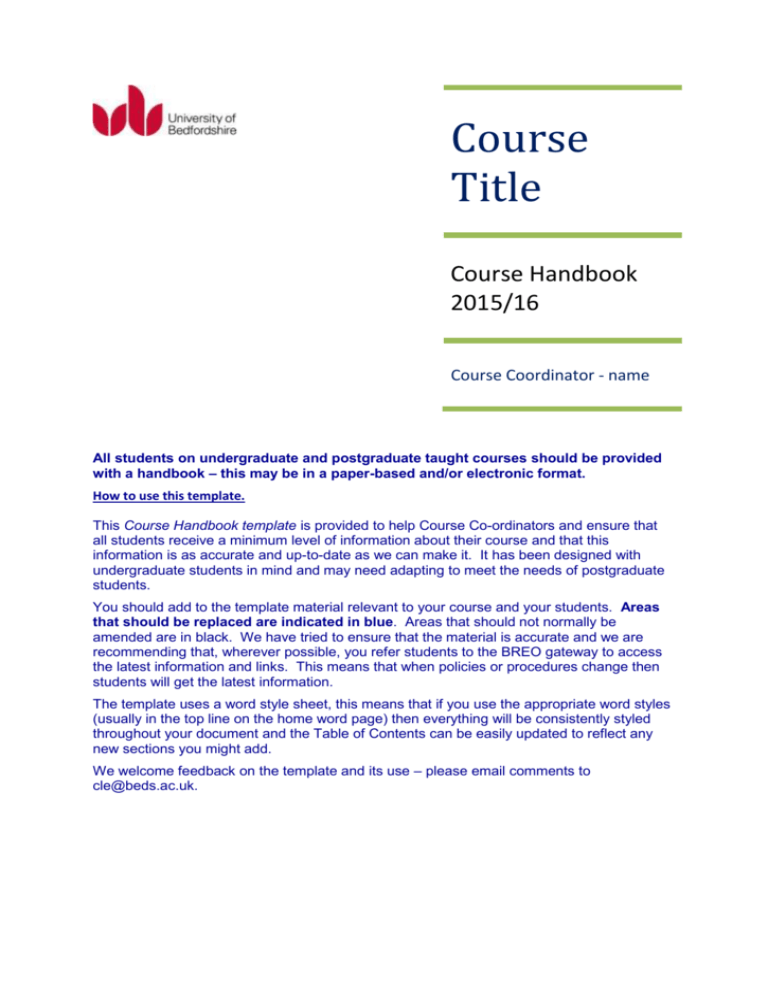
Course Title Course Handbook 2015/16 Course Coordinator - name All students on undergraduate and postgraduate taught courses should be provided with a handbook – this may be in a paper-based and/or electronic format. How to use this template. This Course Handbook template is provided to help Course Co-ordinators and ensure that all students receive a minimum level of information about their course and that this information is as accurate and up-to-date as we can make it. It has been designed with undergraduate students in mind and may need adapting to meet the needs of postgraduate students. You should add to the template material relevant to your course and your students. Areas that should be replaced are indicated in blue. Areas that should not normally be amended are in black. We have tried to ensure that the material is accurate and we are recommending that, wherever possible, you refer students to the BREO gateway to access the latest information and links. This means that when policies or procedures change then students will get the latest information. The template uses a word style sheet, this means that if you use the appropriate word styles (usually in the top line on the home word page) then everything will be consistently styled throughout your document and the Table of Contents can be easily updated to reflect any new sections you might add. We welcome feedback on the template and its use – please email comments to cle@beds.ac.uk. 1 Our Community............................................................................................................................... 1 1.1 1.2 1.3 1.4 1.5 1.6 1.7 2 Studying at the University Of Bedfordshire .................................................................................... 2 2.1 2.2 2.3 2.4 2.5 2.6 2.7 2.8 2.9 2.10 2.11 2.12 2.13 3 Educational Aims and Learning Outcomes ............................................................................. 4 Course Structures and Key Features ....................................................................................... 5 Underpinning Research........................................................................................................... 5 Learning and Studying..................................................................................................................... 5 4.1 4.2 4.3 4.4 4.5 4.6 5 Bedfordshire Resources for Education Online (BREO)............................................................ 2 Your Units................................................................................................................................ 2 Your Timetable ........................................................................................................................ 2 Student Record System (E-Vision) .......................................................................................... 2 Professional Academic Development (PAD) ........................................................................... 2 SiD ........................................................................................................................................... 2 Student Engagement & Mitigation Team ............................................................................... 3 Careers .................................................................................................................................... 3 Health and Safety .................................................................................................................... 3 Equality and Diversity ............................................................................................................. 3 Disability.................................................................................................................................. 4 Students’ Union Contact Information ..................................................................................... 4 Withdrawing or changing courses .......................................................................................... 4 Your Course: Aims and Key Features .............................................................................................. 4 3.1 3.2 3.3 4 Welcome ................................................................................................................................. 1 Why Study [NAME OF QUALIFICATION]?................................................................................ 1 Department of [NAME OF DEPARTMENT] .............................................................................. 1 Your Course Team ................................................................................................................... 1 Contacting Your Team ............................................................................................................. 1 Student [NAME] Society.......................................................................................................... 1 Expectations of students......................................................................................................... 1 Learning Activities ................................................................................................................... 5 Attendance and Participating In Classes ................................................................................. 6 Skills Development .................................................................................................................. 7 Learning Resources ................................................................................................................. 7 Computing and Information Technology ................................................................................ 8 Personal Academic Tutors ...................................................................................................... 8 Study Skills and Related Issues........................................................................................................ 8 5.1 5.2 5.3 5.4 5.5 5.6 Time Management .................................................................................................................. 8 Note-taking in Class ................................................................................................................ 9 Note-taking for Assignments .................................................................................................. 9 Writing up Assignments ........................................................................................................ 10 Guidance on Proof reading ................................................................................................... 10 Additional Support ................................................................................................................ 11 i|Page 5.7 6 Assessment ................................................................................................................................... 12 6.1 6.2 6.3 6.4 6.5 6.6 6.7 6.8 7 Referencing ........................................................................................................................... 11 Assessment Tasks .................................................................................................................. 12 Coursework Submission ........................................................................................................ 13 Exams .................................................................................................................................... 13 Mitigating Circumstances ..................................................................................................... 14 Results and Using Feedback .................................................................................................. 15 Appeals.................................................................................................................................. 16 Academic Offences ............................................................................................................... 16 Course Regulations ............................................................................................................... 17 Having Your Say............................................................................................................................. 18 7.1 7.2 7.3 7.4 Student Representation ........................................................................................................ 18 Bedfordshire Unit Surveys (BUS) .......................................................................................... 19 Tell Us .................................................................................................................................... 19 Complaints ............................................................................................................................ 19 ii | P a g e 1 Our Community 1.1 Welcome This is a general welcome to the student and an introduction to the University. It should place the course in a context, i.e. where does the course sit in the Department? Where does the Department sit in the University? 1.2 Why Study [NAME OF QUALIFICATION]? Give an overview of the course, explaining to the student the benefits and an overview of the structure. 1.3 Department of [NAME OF DEPARTMENT] This is a more in-depth description of the Department. It explains how the Department is structured and its areas of specialism. You can explain the nature of the appropriate faculty as well but students generally closely identify with their department not the faculty. 1.4 Your Course Team Describe the staff who will teach the course, explaining who will teach each part (as far as this is known in advance). 1.5 Contacting Your Team Give contact details of the individual unit co-ordinators and other key members of the team (academic, administrative and professional support). You should also provide details of any restrictions on contact agreed at departmental level. 1.6 Student [NAME] Society Where there is an active, subject-related, student society give contact details and an indication of the range of activities they support. The Student Union can also be mentioned in this context. 1.7 Expectations of students Indicate what you expect from students. General expectations of behaviour and conduct (including attendance expectations and the ramifications for non-attendance; assignment obligations; course work obligations; group work obligations – all can be discussed in this area). Our Community Partnership Agreement (see the BREO gateway) covers our expectations and commitment to all members of our community – staff and students. As a student member of this community it is expected that you will behave in a professional manner and to adhere to the Student Code of Conduct which is accessible through the Links on the BREO Gateway. This outlines acceptable behaviour and emphasises respect for each other and a recognition of the rules of our University. We also have a clear expectations in respect of, for example, academic practice and IT use and both are discussed later in this Handbook. Not knowing the Codes is no excuse - as a student of the University, you are responsible for ensuring you are familiar with them. 1|Page 2 Studying at the University Of Bedfordshire 2.1 Bedfordshire Resources for Education Online (BREO) BREO is where you find key information to support your studies and where you can access the study materials, reading list and other activities that will support your study of each unit in the course. To access BREO, go to https://breo.beds.ac.uk (simply typing breo.beds.ac.uk should get you there in any browser) Your Student Number is your Username. Your password is your date of birth in the form: DD/MM/YY For security reasons you should change your password at your earliest convenience. At the start of your course it is worth spending sometime exploring BREO and the range of resources that can be accessed through the gateway. You can also let us know if there are additional areas that might be helpful to you. 2.2 Your Units You can access the learning materials in your units from the tab on the top of the BREO gateway page. All of the units you are currently registered for should be shown here. If there are any problems then contact your course co-ordinator or the Faculty Office. 2.3 Your Timetable Your timetable can be accessed from the Links on the BREO Gateway. Occasionally we may need to postpone a session, for example if a member of staff is unwell or if weather conditions make travel dangerous, if this is the case we will try and notify you through an announcement in the relevant BREO unit so important to check regularly for updates or via Text (so make sure your contact details are up-to-date – see the next section). 2.4 Student Record System (E-Vision) The student record system contains your results and also your contact details access is from the e-Vision link on the BREO gateway. Please make sure the latter are up-to-date so that we can contact you if we need to (details of how to do this can be found in e-Vision after you log in). You can log in using your Student Number as your Username and your Password which will be provided by letter or e-mail. You will be prompted to change your password the first time you log in. Please note that your password is not the same as your BREO password in order to add an additional level of security for your personal details. 2.5 Professional Academic Development (PAD) No matter how good your academic skills are, if you would like advice on how to improve, please contact the PAD team. They have specialist expertise to help with your academic study and assessment. You can access details about PAD and their services from the Professional Academic Development Link on the BREO Gateway. 2.6 SiD The Student Information Desk (SiD) is your first point of contact for a range of services. Whatever your question or problem, the SiD team can advise you or direct you to more specialist support. Amongst other things they are the first place to go for: Access to Learning Fund forms 2|Page Care Leavers Fund forms Mitigating Circumstances forms Interruption of studies forms Queries about progress of your HE Bursary Request to withdraw forms Council Tax exemption letter Bank letter Student status letter Access to the Engagement and Mitigation Teams Counselling Disability support Dyslexia support Mental Health Support Professional Academic Development (PAD) Student finance advice And much, much more ... For more information, follow the Student Support link from the BREO gateway. 2.7 Student Engagement & Mitigation Team The Student Engagement & Mitigation Team is available to all students enrolled at the University. The advisors are available to give you independent and confidential advice if you are having difficulties with your studies. For more information, see Student Support on the BREO gateway. 2.8 Careers It's never too early to think about what you might do once you complete your course. Employability is a key element within your course, but you may also find it invaluable to contact the University's Careers & Recruitment Services team. They are available to support you in your career planning before, during and after university. Find out more from the Careers & Jobs link on the BREO gateway. The team offer an agency style service to local employers looking to recruit students and graduates. Make sure you register with them if you are looking for work by emailing your CV to hireme@beds.ac.uk. Graduate employment opportunities are advertised through the iProspects area of their web site. 2.9 Health and Safety We are committed to ensuring that the University is a healthy and safe place in which to study and work. As a community of individuals working together, it is important that we all play our part in keeping our environment safe. You can help us (and comply with legal requirements) by ensuring that you understand and follow the health and safety procedures and guidance, and by taking care of yourself and those around you and reporting any issues that give you cause for concern. Add any course specific health and safety issues here. 2.10 Equality and Diversity The University is committed to promoting equality of opportunity to enable students and staff to reach their full potential in an environment free from unfair and unlawful discrimination. 3|Page We expect students and staff to respect each other as individuals, each with significant value and potential. This enables the work we collectively and individually produce to benefit from a wide range of influences. The University's Equality and Diversity policies are available from the Links on the BREO gateway. 2.11 Disability If you have disclosed a disability (includes long term medical conditions and Specific Learning Difficulties such as dyslexia) to the university, please contact the Health & Wellbeing Team for an appointment. At the appointment, the team will discuss your learning support needs including examination access arrangements, where appropriate. It is important to get this support in place as soon as possible so they can support you to achieve your full potential. You can talk to the team in confidence about any concerns you have about your learning support needs and they will advise you how to obtain the support you need. Contact : Student Support Reception Bedford campus: H Building (01234 793333) Luton and Buckinghamshire campuses: Level 2, Campus Centre (01582 489622) You can access more information from Student Support area via the BREO gateway. 2.12 Students’ Union Contact Information BedsSU is available to listen to, and represent, the many voices of students at the University of Bedfordshire. As a University of Bedfordshire student, you are automatically a member of BedsSU. Please visit their website www.bedssu.co.uk or follow the BedsSU link on the BREO gateway to check out all they have to offer. 2.13 Withdrawing or changing courses If you feel you need to interrupt your studies or are considering leaving the University then you should arrange an appointment with a Student Engagement Advisor. The Advisors are part of the Student Engagement and Mitigation (SEAM) Team within Student Support. They can offer you confidential advice, discuss your options and ensure you understand the implications of your decision. All students who decide to interrupt or withdraw from their studies must submit the relevant form. Interruption and withdrawal forms and the steps you need to follow can be found at www.beds.ac.uk/studentsupport. International students must speak to the International Office regarding their request to interrupt or withdraw. If you have any additional queries you can contact Student Support Reception on 01582 489622. You can access the team through SiD via the Student Support link on BREO. 3 Your Course: Aims and Key Features 3.1 Educational Aims and Learning Outcomes This is where you list and explain the educational aims and learning outcomes of your course, as defined on the relevant CIF. 4|Page 3.2 Course Structures and Key Features Your course is made up of a number of units. Each unit has an academic level and a specific credit rating which indicates the amount of learning hours it will require (each credit equates to ten learning hours). Typically you will study 120 credits each academic year. Describe the course in more detail including the units that make up the course, core and option, and their credit ratings. 3.3 Underpinning Research Describe the research that underpins the course. 4 Learning and Studying 4.1 Learning Activities Suggested text for adaption: Studying will involve your participation in a wide range of teaching and learning activities. Lectures and seminars will take up some of your time but in addition you will be expected to engage in a range of activities designed to support and develop your learning. This will include reading set texts and other materials, perhaps working online, preparing for taught activity and for assessments. For each unit you study you will be provided with details of the expectations on that particular unit through BREO (follow the tab at the top of the BREO gateway to access your units). The common forms of teaching and learning are: Workshops: Practical sessions designed to introduce you to skills, methodological frameworks and conceptual frameworks which will be foundational in developing your approach. Lectures: Used to transfer and contextualise theoretical concepts relating to performance practice. You may also test out ideas in practice within the context of a lecture. Not just about sitting and listening but often interactive in approach. Seminars: Designed to involve you in discussion and detailed consideration of theoretical concepts, ideas and performance practice. Some seminars may also involve presentation of practical work to both exemplify and develop understanding on a particular topic. Tutorials: Small group or individual discussions with a tutor, used to enhance understanding of practice and theoretical concepts through tutor’s feedback. Work-based practice: Designed to develop skills through the application of theoretical concepts in practice and to develop a practical understanding. Peer Assisted Learning (PAL) PAL is a key part of the student experience and something which all 1st year students have built into their course timetables. 5|Page PAL is a weekly, timetabled session which runs throughout term 1 and term 2. Relaxed and friendly, PAL gives you opportunities to connect with your classmates, your subject, and with the university. "By students, for students", PAL sessions are facilitated by 2nd and 3rd year students from your course. They have "been there, done it and got the t-shirt", and have successfully completed the first year. Your PAL Leaders are well placed to lead discussions and activities to enable you to learn co-operatively and informally with your classmates. You can have a say in dictating what you do in your PAL sessions, giving you a voice and real ownership of PAL. Your PAL Leader team don't teach you; rather they help you to work with your classmates to work things out for yourselves. PAL sessions cover a variety of themes and activities including quizzes about BREO, debating topical news in your subject, discussing lecture content, and guiding you through assignment planning. As well as working with you to devise sessions, your PAL Leaders work with your 1st year tutors, so they know what you have done in class, and what assignments and exams you have coming up. They have access to your BREO units, ensuring that they are able to give you up to date guidance and news. They always come prepared and will put a session together in collaboration with you and the rest of your group. PAL is intended to complement your lectures, workshops and seminars, by giving you an informal, but informed space in which to discuss and to share ideas. Guided Learning: Designed to support your learning through specific activities which augment, extend and deepen what’s covered in timetabled teaching activities. Independent Learning: This is a crucial part of developing as a learner. Independent Learning is designed to facilitate your independence through enabling you to take responsibility for your learning. You will be required to prepare work outside the class/lecture contact time and should regard this in the same way as preparation and research towards any assignment. The practice of developing an independent, self-motivated approach to learning and delivery of your work is essential to your success and to achieving good marks. Autonomous Learning: For some units, particularly at the end of your course, you may be responsible for finding your own material relevant to your specific interests. 4.2 Attendance and Participating In Classes Studying at the University of Bedfordshire is not just about subject knowledge. We are also concerned to help you develop your wider attributes and skills. To do this you will need to attend and actively engage in the range of learning activities that have been carefully designed into your course. Your attendance in your classes is fundamental to your academic development, and for that reason we will monitor your attendance and contact you if it gives cause for concern. Support will be provided, but as a university student you will be expected to take an increasing responsibility for your own learning. It is very different from school or work environments, and on your journey you will learn not only about your subject, but about yourself and your strengths. All students are expected to demonstrate the same professionalism expected within a professional environment: Prompt attendance at all scheduled sessions. Involvement and engagement with tasks and sessions. 6|Page Submission of all required materials within deadlines. Notification in advance of any problems which prevent your attendance or submission of work. Not to leave and re-enter rooms during teaching sessions without a medical reason. To switch mobile devices off unless you are using one as an integral technology for the session. To facilitate an ideal learning environment for yourself and those students around you. 4.3 Skills Development Suggested text: One of the particular advantages of studying at the University of Bedfordshire is the specialised support which is available to enable you to develop your individual skills and professionalism. While your own individual involvement and approach to your studies is essential, the way you study and learn is collaborative. During your studies you will learn to develop particular skills or understanding. Learning will happen with lecturers, your personal academic tutor, course or unit tutors, your peers, professional services staff, and through your own research. There will be times when you will be directed to seek advice from support teams or specialist services, but if you feel that you need additional assistance with your studies, you should not wait until someone refers you for help. You can self-refer to many of the services provided by the University like Professional Academic Development (PAD) or Learning Resources through the links on the BREO gateway. 4.4 Learning Resources Suggested text: Although the Internet is a place to look for materials and resources to support your learning, not everything on the worldwide web is academic, of equal value or reliable. You will need to make judgements about the relevance and accuracy of anything you find there. You will also need to cite it appropriately. A good place to start looking for information on your subject is the books and journals (both print and electronic) that are purchased by the Library. Your BREO units will include designated reading lists and online subject guides, available through the Learning Resources link in BREO, will identify some of the best additional resources available to you. Finding the right information and search techniques to develop your subject knowledge and complete your assignments can be hard. Your Academic Liaison Librarian will be able to help you identify the best resources quickly. Find them via the Learning Resources link in BREO. Online help is available via the Invisible Library. This covers various areas of advice including: an introduction, finding and locating information, understanding your subject, understanding information, sources of information, planning a search strategy, evaluating the effectiveness of a search, referencing your sources and managing your time. Every library has ground rules to ensure everyone is treated fairly and can use the resources effectively. These range from returning books with fines for late returns, to guidelines as to what is expected in the library areas. Please make yourself familiar with these rules so that you don't inadvertently fall foul of the rules. Details of site Libraries and any subject specific resources should be added here. 7|Page 4.5 Computing and Information Technology Suggested text: The University has a very strict policy on the appropriate use of its IT resources. Every student and member of staff is required to accept the Network Use Policy upon joining the University, and reminded of it on the front screen of every wifi login. Make sure you are familiar with, and abide by, the policy. You can find the policy and some guides to standard IT packages via the Computing &IT link on BREO. Competent computer use is an essential skill in today's world, and is something that employers seek. Study Hub online (access this through the BREO Gateway) offers computer skills training to all students studying at any campus within the University. Workshops are suitable for beginners and for students wishing to enhance existing skills. Use of specific specialist software and hardware may be required within certain courses, and these specialist skills are taught within that subject area by tutors and demonstrators. 4.6 Personal Academic Tutors Suggested text: Every student has a Personal Academic Tutor (PAT), someone to help you achieve your goals. If you are not aware who your PAT is, you need to check with your Course Coordinator. Conversations with your PAT focus on unlocking potential, helping you to learn and become more self-aware, increase motivation, independence, and self-confidence. Make sure you use the benefit of your PAT’s experience when you need help or advice, as well as for directed sessions. If you are a first year undergraduate or a new postgraduate student, your Personal Academic Tutor will make contact with you to arrange a meeting soon after you start your studies. PAT sessions are where you and some of your fellow students can get to know each other and the University. It’s important we get to know you as well, to find out your ambitions and plans and how we can help you make the very best of your time at University. Your PAT can enable you to gain insight into what you have come to study at UoB. Your PAT will support your academic progress, helping you achieve your goals and guiding you through your studies. Tutoring is individual too. Your PAT will meet and advise you individually during the year. If you have personal worries or concerns that may affect your work, your PAT will be able to direct you to the right support. Do contact them as soon as a problem arises and don’t let it escalate. If you have anything confidential to discuss with your PAT tutor, drop them an email to ask for a one-to-one meeting. 5 Study Skills and Related Issues 5.1 Time Management Suggested text: During your time at University you are likely to be juggling academic work with other demands such as paid employment and family commitments. In order to achieve a successful balance it is important to plan. One way of managing these demands that works effectively for many students, whatever their level of study, is to draw up a list of tasks you 8|Page need to carry out in order to complete your academic work successfully (attending classes, collecting information, reading, note taking, writing and so on) then plot these on a weekly timetable working backwards from assignment deadlines (these can be found in the unit sites). You will obviously need to construct this timetable in such a way as to accommodate the other demands on your time, always allowing some extra time to cope with unexpected matters, such not being able to find the right book or journal when you want it, computer malfunctions, extra shifts at work or family illness. Professional and Academic Development run valuable academic skills workshops which are free to all students. One of these tackles organisation and time management. 5.2 Note-taking in Class Suggested text: In lectures and seminars, it is good practice to take notes even if handouts are provided. You might, for example, jot down your understanding of what is being said in your own words or repeat some of the examples given to illustrate key points. The very act of writing will help you to concentrate as well as to fix the ideas and issues in your memory and assist understanding. Where handouts are not provided, don’t try to take down everything the lecturer says but concentrate on key issues. The lecturer will often assist in this process by putting the main points on BREO. Don’t limit your notes to the points on the slides though. What you want to concentrate on is what else the lecturer is saying. Note the examples or words and phrases that particularly convey the meaning for you. As your knowledge and understanding of our subject grows, and you are practised at note taking, you will probably take fewer, more focused notes. Build the task of writing up or word processing your notes as soon after the lecture or seminar as possible into your timetable. This will assist understanding by further fixing the ideas and issues in your mind and highlighting any areas of confusion to clear up through further reading or directly with the lecturer concerned. 5.3 Note-taking for Assignments Suggested text: You will also need to make notes of the reading you do when preparing for assignments. When writing an essay, report, or seminar paper, for example, you might undertake some initial general reading to work out your overall approach to tackling the issues involved. Use the reading suggested in the unit reading list or flagged up by teaching team. At this point, you might need to take only brief notes to record the sources you have drawn on and the key points addressed. Once you have drawn up an assignment plan (see next section) then you will need to take further notes of your reading under the different headings outlined in your plan. Don’t be tempted to simply copy from the book, journal or Internet site unless you intend to quote directly from that source. Rather focus only on the essential points you want to convey, and try to express in your own words the essence of ideas and issues expressed and their relationship to the assignment topic you are addressing. Above all, write down or log the source of your notes where they are drawn from another author. The easiest way is to construct an overall list of full references, then in your own notes you need only record the last name of the author, publication date and page number. It is essential that you do this so that you can identify the source if you want to return to it and critically so that you reference correctly in your completed assignment. 9|Page 5.4 Writing up Assignments Suggested text: The key to effective assignment writing is preparation, which in turn involves planning and time management. Having a plan is essential. Study the assignment guidelines, work out what is required and do some initial reading and planning. Ensure plenty of time to check your approach with the lecturer concerned during an office hour or pre-arranged time well before the assignment is due in and refine your plan as necessary. An effective plan outlines the structure of your assignment, which should include an introduction, a middle section (main body) and conclusion. For the middle, it is useful in a plan to list the different sections of your assignment under headings underneath which you can make a brief note of the issues you intend to discuss in that section. At the beginning of each section in your plan you should also make a note of its relevance to the assignment title and to the preceding discussion. This will help you to construct a discussion that flows according to an explicit logic. In the case of an essay, for example, this will often consist in presenting first the pros then the cons of an argument. Whilst it is not usual to use sub headings in an essay (although you would use them in say a report or seminar paper), you need to be clear in your plan about the ordering of your discussion and the way that the points you are making connect. Without a plan, your discussion is likely to lack focus and to be driven by your reading rather than by the question and your own informed thinking. Once you have developed a plan, you can undertake more detailed reading and note taking as outlined below. Adapt your plan if necessary to take in important new points or shift the emphasis, but don’t be tempted off at a tangent by something you have read which may seem interesting but which is not strictly relevant to the question. When adapting your plan, go through the same procedure of noting the relevance of each point to that section and to the discussion as a whole. 5.5 Guidance on Proof reading Proof reading is the process whereby the final draft of a piece of academic work is checked for errors in grammar, style, formatting and spelling for amendment before submission. The University of Bedfordshire recommends that students proof read their own work as a matter of good practice. The University does not provide a proof reading service and it is not appropriate to ask your tutors to proof read your work. If you ask a fellow student or other individual to proof read your work you must ensure that this does not involve editing the text to make significant changes to terminology or the ideas presented. There is an important difference between grammar and spelling, which it is acceptable to amend, and knowledge and understanding which must be your own. This guidance is designed to illustrate what is acceptable. Your work must show your own ideas on the topic supported by evidence and information from sources which are correctly referenced. Thus, it is not acceptable for someone else to change the vocabulary, terms and phrases within an assignment as this would then mean that the work submitted is no longer your work. You are responsible for the academic work which you submit. Any errors or academic offences within a piece of work submitted for marking will be considered your responsibility and not that of the proof reader. If work which is proof read is returned with changes already made, you cannot be certain that these changes are not plagiarised. If substantial amounts of text have been changed, then it may be considered that the work is not completely your own work which is considered a serious academic offence. What is acceptable? 10 | P a g e If someone else proof reads an assessment they should do so well in advance and only be checking for the following: Typing errors Spelling Punctuation Formatting Inconsistencies in presentation Clarity of argument Referencing errors (such as missing quotation marks or citations, and missing sources in the reference list where a citation has been used in the text) A proof reader should identify any of the above errors on the draft so that you can then check and make corrections should you wish to do so. The proof reader should not make the changes for you or suggest alternatives. Thus the following are not acceptable and may lead to an academic offence. What is not acceptable? Rewriting text to change the meaning Rewriting text to change an argument Rearranging the structure of the assignment Suggesting alternatives Correcting errors that are factual or calculated from data (although the errors may be pointed out) Correcting plagiarism Changing the vocabulary 5.6 Additional Support The University’s Professional Academic Development (PAD) team provide guidance on proof reading your own text. 5.7 Referencing Suggested text: Referencing - an essential skill In your assignments you are expected to reference everything you have read and used, whether this is a direct quote or a paraphrase (using your words to describe what others have written or said). This could include a whole range of resources such as books, articles, web pages, pictures, film, performances, blogs, sound recordings. Why do you have to reference? At university level you need to read widely and understand the ideas of other people. You also need to be able to interpret, discuss and incorporate this into your academic work because you will be assessed on your understanding and your use of these resources. Referencing is a way of proving you have done this and of indicating the ideas that are yours and those that belong to other authors. Not referencing correctly is effectively misappropriating the ideas of others. Referencing enables you and your readers to trace useful material again and will make your work look scholarly. 11 | P a g e Which style should you use? Indicate the appropriate referencing system here. You can also find advice and guidance in the Learning Resources referencing web pages. Where to go for help? As part of your course, you will have the opportunity to learn how to reference, this might be done by your Unit Leaders or your Academic Liaison Librarians. If you want further help you can book an appointment with your Academic Liaison Librarians or Professional Academic Development (PAD) tutor. Workshops are offered throughout the year and it is worth signing up for these. Details can be found on the Learning Resources web page. RefWorks Through Learning Resources you have access to an excellent web-based reference management system called Refworks. It's easy to use and you can book an appointment with your Academic Liaison Librarian to get started. Academic Integrity Resource (AIR) The AIR will be deployed in one of your course’s core units and is a resource that has been designed to make you aware of good academic practice. This includes an awareness of plagiarism and referencing processes, among many other things. 6 Assessment 6.1 Assessment Tasks Suggested text: Assessment is not just about ‘grading’ your performance but is an integral and important developmental part of your learning. Preparation for assessment, undertaking the set tasks and using the feedback provided helps you to develop and demonstrate skills as well as evidencing your knowledge and understanding. Your tutors will provide details of the specific tasks for each unit in BREO. You may also be provided with additional assessment briefings, and staff will use the teaching time with you to explore what is expected within each assignment and how it links to the course and unit learning outcomes. For every assessment you do, staff will indicate what is required of you, how you will be marked and details of when the assessment is due to be submitted. If you require further information and help on what is expected for each assessment task then consult your unit tutor. If you want more general help with preparing for assessments then visit the Study Hub: Online BREO Community. Use this section to describe the range of assessment tasks that the student will be expected to complete. For written tasks (suggested text): Make an outline plan and stick to it when writing up your first draft. In your introduction – which may be the last section you write – outline the key themes pursued in the assignment and the order in which you are tackling them. In the main body of the assignment, write a linking sentence or phrase at the beginning of each new section to show where the discussion is going and how it relates to the last section and to the task as a whole. Until you are fluent in subject specific terminology, it is better to use your own words when writing up your notes. This will assist your understanding and better communicate the level 12 | P a g e of your comprehension to the marker. In your conclusion, draw the threads of recommendations as required by the assignment task. Ideally you will have allowed sufficient time in your action plan (see time management) to put this draft aside for a short period. Then you will come back to it with a fresh mind and will be better equipped to spot errors, lack of clarity in the discussion or missing elements. Be prepared that you will draft, redraft and continue redrafting, usually until you run out of time. Remember to check for spelling, grammatical, factual and referencing errors before you submit anything at whatever level you are studying. Don't lose marks unnecessarily. Writing in Academic English Academic English: is usually formal in tone and impersonal in style avoids contractions or shortened forms of verbs, such as won’t, doesn’t or it’s avoids using a linking word such as ‘and’ or ‘but’ at the beginning of a sentence avoids personal pronouns such as I, me, you, your may use the passive form of verbs avoids verbs that are composed of multiple words, such as ‘give up’, ‘put up with’ tends to employ a cautious way of explaining findings, using expressions such as ‘may’, ‘it is possible that…’, ‘could’ may use specialised vocabulary. 6.2 Coursework Submission Each Unit's BREO area will explain exactly how your tutors expect you to submit your assignments. This will usually be online through Turnitin, which is a tool that checks submissions for matches to work on the Internet and to the work of other students. Each assessment brief will also carry details of the learning outcomes your work will be expected to meet, how you will be expected to deliver your work, the format, the presentation, the deadline date and information about how to receive the essential feedback on your work (through BREO and possibly other means). These are all provided to support you to succeed - but if you are unclear about assessment requirements or submission procedures, ask your tutor either in the taught sessions or in their office hours. See the Mitigating Circumstances section below for advice about what to do if you think you won't be able to meet a deadline. Do note that lecturers are not able to extend deadlines. 6.3 Exams The really useful Exam Information site from the BREO gateway contains essential information about exams and the exam timetable when it is available. For exam revision and preparation, please visit the Professional Academic Development website. The University recognises that during your time at University you may experience serious and exceptional circumstances that are unavoidable and affect your ability to complete an assessment or sit an exam. Lecturers cannot grant you an extension on an assignment or a re-assessment opportunity for an exam. The only team who can award extra time for your work or another attempt at an exam is the Student Engagement and Mitigation (SEAM) Team within Student Support. 13 | P a g e To request an extension or reassessment you must submit a completed Mitigating Circumstances Application Form and provide appropriate independent evidence. Mitigating Circumstances Application Forms accompanied by appropriate evidence must be submitted to SEAM before or on the submission date for the assessment. If your application is not submitted to SEAM on or before the assessment submission date, your application will normally be refused. Late applications will only be considered in exceptional circumstances, details of which can be found at www.beds.ac.uk/mitigation, where you will also find full details of how, where and when to submit an application and the University's criteria for mitigating circumstances. If you have any additional queries you can contact Student Support Reception on 01582 489622. 6.4 Mitigating Circumstances Coursework must be handed in by the date and time specified. This will be given to you in your unit handbooks, on the assessment brief and/or on BREO. Late work without formal agreement is not accepted, and will be deemed a fail and marked at 0 (no work submitted). We are very firm about this because working to deadlines is an important life skill which we encourage you to develop during your studies. Sometimes things outside your control can affect your ability meet a deadline. If you believe that you are likely to miss a deadline for a valid reason (see below for reasons considered valid under mitigating circumstances) then you should apply to the Student Engagement and Mitigation Team (through SiD) for an extension. Only they can make the decision. It is important to realise that your lecturers are not able to extend published deadlines. What are mitigating circumstances? Examples of circumstances that would justify special consideration include: Serious personal injury, broken limbs, or a medical condition requiring hospital attention or with an incapacitating effect. An acute illness that makes it impossible to complete the required task. Being a victim of a serious crime during the period immediately preceding assessment. The serious illness or death of a close relative: normally a partner, parent, child or sibling. Birth of a baby and/or unforeseen pregnancy complication. Normally not acceptable are: The death or illness of a distant relative. Financial problems, including payment of fees to the University. Difficulties with housing. Difficulties with baby-sitters, child-minders. Transport difficulties such as public transport strikes, road works or private transport breakdowns. Confusion over time, date location of the examination, or assignment hand-in date on the part of the candidate when this has been clearly notified, and has not posed any problem to other students in the group. Work pressure if you are enrolled as a full-time student. Cases where medical certificates are retrospective, i.e. dated/issued after you have recovered from the illness claimed. 14 | P a g e Any claim not supported by independent and reliable evidence. Computer problems such as viruses, memory stick failure/loss, printer problems, network problems. Problems with receiving/submitting referral work and results. Problems handing in an assignment to the designated place by the deadline. Collecting data/more data for an assignment. You can find out more details about mitigating circumstances and how to apply via the Student Information Desk (SiD). Essential Advice: If you submit a claim for mitigating circumstances, don't assume it will be accepted. You need to do your best to get work prepared because it is your responsibility to complete your assignments/sit exams in order to progress on your course. 6.5 Results and Using Feedback The University uses a percentage marking system to grade your performance. Mark Band% 80-100 75-79 70-74 67-69 64-66 60-63 57-59 54-56 50-53 47-49 44-46 40-43 35-39 25-34 1-24 0 Grade Descriptor Classification Outstanding Excellent First class Commendable Upper Second Class Good Lower Second Class Satisfactory Third Class Marginal fail Fail Fail Non-submission The weightings for each assignment will be given in the relevant assessment information. We feel it important that you receive focused, meaningful and timely feedback to support your learning. It is also important that you reflect upon and use any feedback to develop your skills and improve performance. In line with other institutions, the University utilises a series of marking strategies to ensure that your work gets the mark that it deserves. Your work will be graded by your tutor and will also be second marked independently to ensure that the grade is appropriate. In addition, an independent external examiner from outside the University samples student’s work to ensure that our standards are consistent with those at other universities. As a result, the initial marks that you receive on your work are provisional and may vary slightly from the final mark which is confirmed at exams boards at the end of the year. External Examiners write annual reports on your course. You can access those for your course by contacting your tutor and they will be shared with your representatives at Course team meetings and Portfolio Committees (we are currently exploring how to make these more readily available to you). 15 | P a g e 6.6 Appeals Because of the steps we take to ensure that your marks are correct you can only appeal against the mark given in certain circumstances and only after an examination board has confirmed the mark. You can find the details of the University’s appeals process via the Appeals & Complaints link on the BREO gateway. 6.7 Academic Offences Academic offences include a range of actions designed to deceive and gain an unfair advantage over other students. This is unethical and threatens the integrity of our assessment procedures and the value of the University’s academic awards. Your academic performance will be assessed on the basis that anything you submit for assessment is your own work. Anyone thought to be gaining an unfair advantage in any form of assessment is subject to formal investigation in accordance with University Regulations (follow the link on the BREO gateway. It is your responsibility to ensure that you are not vulnerable to any allegation that you have breached these regulations (for example by sharing your assignments with friends in such a way that they can copy your work and claim it as their own). Penalties for students found to have committed an academic offence may include failure in a unit or an element of a unit which may mean that you have to repeat the year as a part-time student and bear the associated financial cost. In extreme cases you may be required to leave the University. During the course we will introduce you to correct academic practice to help ensure that you know what we are looking for in your assessments. Plagiarism Plagiarism is the most common mistake. This is presenting the work or ideas of someone else as your own. If you repeat someone else's words or images and claim them as your own, or present someone’s line of thinking as if it was your own, you will have plagiarised. You can use other people’s ideas, words and images, but it’s important that you acknowledge them through appropriate referencing. Plagiarism may be deliberate or accidental, but if it occurs within your work it will be considered an academic offence by your tutor. Remember that your examiners want to assess your ability, not those of others, so it’s important that you interpret others’ work and that there is sufficient of your own work in your assignments for your ability to be assessed. You should keep a careful record of all the sources you use, including all internet material, and ensure that you understand correct referencing practices. Following 'referencing conventions' will protect you against plagiarism (see the earlier section on referencing). Collaboration or collusion? Collaboration working with others is often essential. Collusion working with others to deceive is cheating and not allowed. Discussing ideas with your fellow students is part of learning, and we encourage you to do this, to exchange interesting and relevant sources and references. There is a distinction between sharing ideas and collusion, which is an academic offence. When completing an individual assignment you must not work with others to the extent of exchanging written materials that you have prepared, such as notes or assignments or drafts, unless you have been expressly told that this is permissible. If these types of 16 | P a g e materials are shared and submitted it will be regarded as an offence for the person who lends the material as well as the person who uses it. Protecting your work Your own work should be regarded as your own property and you should protect it. Always submit your own work rather than asking a fellow student to submit work for you. If you are working in a shared space, log off from the computer you are using whenever you take a break so others cannot access or copy your work. Take care to destroy printed drafts or copies of work, rather than merely discarding them. Don't give your work to others in any format unless this is part of a set task. If you are working on a group or team assignment, make sure you understand the allocation of responsibilities between yourself and the other members of the team. Make sure that you correctly label your work files so that the version you submit is the correct and final version. What is counted as cheating in exams? To avoid cheating, you must not communicate with other students during an exam or test, and you must not take into the exam or test room any materials, notes or aids, other than those which have been officially authorised in the examination paper. If an invigilator observes you with any prohibited material, notes or equipment or observes you communicating with another student, your actions will be investigated and you may be subject to a penalty. Details of what is allowed and not allowed in the examination room is available in the Exam Information community accessible through the BREO gateway. 6.8 Course Regulations This section summarises what you need to do to pass and progress through your studies. The full and definitive version is provided in the University's Regulations. You can find them through the BREO gateway. The following is provided for undergraduate courses as a summary. Describe any awardspecific regulations covering the course. Passing units and Progressing To pass a unit you must attempt all the assessments unless otherwise specified. Depending on your level of study, non-submission may lead to you failing the unit and prevent you from progressing. Each assessment you undertake will have a weighting towards the overall grade for the unit. This will be given in the assignment brief. To pass a unit you must gain an aggregate grade of 40%. The aggregate may include an individual assessment mark at 35 - 39% but it should not normally include an individual assessment grade of less than 35%. To progress between years, you must pass 90 academic credits with a grade of 40% and have attained a grade of at least 35% in your remaining 30 credits. In the final stage of your course, you must accumulate all academic credits needed for the award for which you are registered. What if I fail an assessment? If you fail one point of assessment in a multi-assessment unit with a mark between 35 – 39% you will pass the unit if your overall aggregate grade is greater than 40%. 17 | P a g e If you fail one point of assessment in a multi-assessment unit with a grade of less than 35% then you will normally be given a referral (depending on the nature of the assessment) which must be completed to progress even if the aggregate grade is above 40%. What if I fail a unit? If you fail a unit you will be required to retake that unit. If it is a minor fail, you may be able to progress under the progression rules. Honours classification Delete if not appropriate Honours degrees are classified as First, Upper second, Lower second or Third class. Your classification is calculated in one of two ways. Either in the penultimate and final stages of your course: marks from the units comprising the best 90 credits at the final stage, including at least 30 credits from the designated project, are double weighted; and marks from the units comprising the best 90 credits at the penultimate stage are single weighted; and the result of this weighted average calculation is rounded to the nearest whole number using the convention 0.5 and above rounded up, otherwise rounded down. Or in the final year: the Honours classification is based on the average of the grades attained in 90 credits at the final stage, including at least 30 credits from the designated project. The classification is determined using both of the above methodologies and you will be awarded using the higher of these calculations. Examination Boards Courses have two levels of formal decision-making on your progression and awards: Portfolio Boards and the Scheme Boards. Portfolio Boards involve internal and external examiners (experienced academics from other universities who ensure that our standards are correct). The Board helps ensure that the marks you have been given are accurate and appropriate to the standard of work you submitted. Scheme Boards ensure consistency across the university and confirm final awards. 7 Having Your Say 7.1 Student Representation Student Representatives give a voice to students on your course (Course Reps) and in your faculty (Faculty Reps); are an important part of the development process of the University for courses and units; help to resolve course/faculty related issues; talk to fellow students and make their views known in departmental meetings to ensure the course is as good as it can be; work with course teams to make courses deliver the best student experience possible. Faculty and Course Reps are valuable individuals who get training organised through the Students' Union to help develop their skills. It is an important job and one which carries 18 | P a g e weight on a CV. To become a Course Rep put your name forward in course sessions which will be held either during induction or in the first two weeks of the course. 7.2 Bedfordshire Unit Surveys (BUS) Your views on your learning experience are extremely valuable and will help the course team make improvements in future years. You will be asked to complete a questionnaire for each unit, so please ensure your feedback relates to the specific unit only. Your tutor will not be able to identify you directly from your answers, so please be open, honest and constructive. You should see the results of previous surveys in your BREO units and this is also where you find the outcomes of your views once the data have been collected and analysed. 7.3 Tell Us The Tell Us process allows you to raise issues immediately and get a response (providing you give us your contact details). You can use Tell us to identify things that we can do better or to recognise the things we are doing well. Follow the link on the BREO gateway to find out more about this process. 7.4 Complaints We do everything we can to ensure that you have a high quality learning experience whilst studying at the University but sometimes we may get things wrong or might do things better. If you have issues please do inform us. In the first place we would rather that you raised this with us directly (contact your tutor or course coordinator) but there are additional routes for you to raise issues. You can use your course rep, raise issues through the ‘Tell Us’ scheme or, as a last resort, raise concerns through the University’s complaints procedures. You can find details of all of these via the Complaints & Appeals link on the BREO gateway. 19 | P a g e
